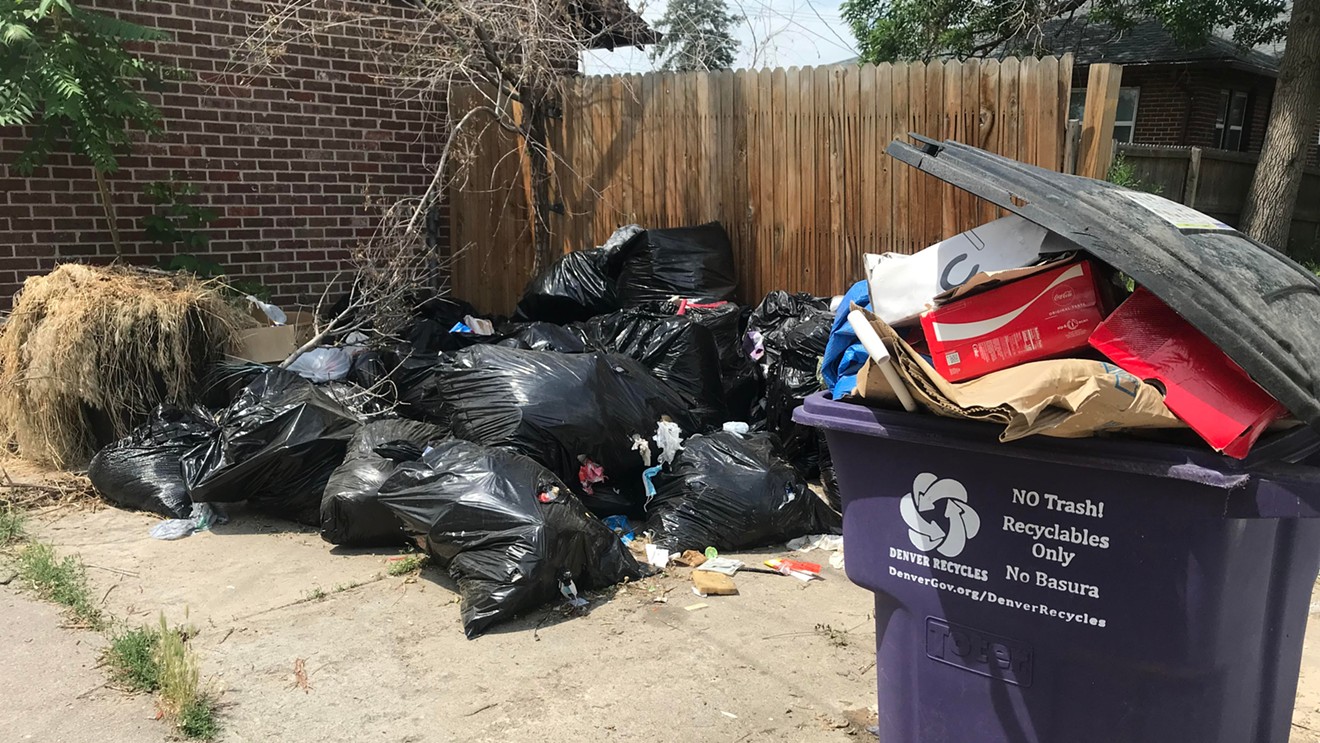A huge pile of trash behind a home in the Skyland neighborhood attracted raccoons and rats for weeks before pressure from neighbors and city inspectors finally succeeded in spurring its removal — and this scenario is hardly unique. Every month, Denver receives as many as 1,000 trash-related complaints, and the system for dealing with them is multi-layered, since the people responsible for the rubbish sometimes need a lot of persuading — often by way of escalating fines — before they make it go away.
Trash was a hot topic in the run-up to last week's Major League Baseball All-Star Game, thanks to controversy over the city's sweeps of homeless encampments. But according to Nancy Kuhn, spokesperson for Denver's Department of Transportation and Infrastructure, staffers there don't differentiate trash issues related to such sites from any others.
"Trash complaints routed to DOTI’s Solid Waste Management Division through 311 are looked at by location and whether the complaint appears to be a case of illegal dumping," Kuhn notes. "We’re either going to send the closest crew by to pick up the trash, no matter who left it, or we’re going to send an illegal-dumping inspector by to hopefully identify the responsible party and have them address it."
Here's how Amanda Weston, communications specialist for Denver Community Planning and Development (CPD), defines the size of the problem that piles up in Denver: "On a monthly basis, our inspectors perform approximately 200 to 1,000 inspections related to trash complaints on private property. Please note that this number includes multiple visits to properties. If the inspector finds a violation and needs to return to the address to perform a re-check, or multiple re-checks, each visit is reflected in this number."
While some residents think Denver's trash problem is worse than ever, that's not reflected in CPD's data. "The number of inspections was slightly higher in 2020 than in 2019," Weston notes, "but they are trending lower for 2021."
Once inspectors receive a complaint, they're tasked with responding within three business days.
"Zoning/Neighborhood Inspection Services, or ZNIS, opens a case," Weston explains. "This occurs whenever a concerned resident reports a problem through the city’s 311 information line, or when an inspector spots a violation during the course of his or her work."
After that, she says: "The inspector notifies the property owner of the violation, providing information about how to correct the problem and the period of time he or she has to do so. This first notice carries no fine. When an inspector comes to re-check the violation, if the problem has not been addressed, a second notice is issued. This notice doesn’t carry a penalty, either."
The meter starts running from there. The third notice of violation results in a citation and a $150 fine, with the fourth notice triggering another citation and a $500 fine, and the fifth notice generating a third citation and a $999 fine. Along the way, the city also has the option of issuing a court summons.
"In rare cases where a property owner has failed to correct a recurring problem," Weston adds, "inspectors have discretion to move immediately to citations and bypass the preliminary notices. This can help to ensure that the property doesn’t fall into a pattern of overall violations punctuated with temporary fixes."
Weston concludes: "Neighborhood inspectors work to ensure Denver’s neighborhoods are safe and well-maintained and contribute to the livability and vibrancy of our city. Property owners are responsible for the basic care and maintenance of their property."
Some take that responsibility more seriously than others.
[
{
"name": "Air - MediumRectangle - Inline Content - Mobile Display Size",
"component": "12017618",
"insertPoint": "2",
"requiredCountToDisplay": "2"
},{
"name": "Editor Picks",
"component": "17242653",
"insertPoint": "4",
"requiredCountToDisplay": "1"
},{
"name": "Inline Links",
"component": "18838239",
"insertPoint": "8th",
"startingPoint": 8,
"requiredCountToDisplay": "7",
"maxInsertions": 25
},{
"name": "Air - MediumRectangle - Combo - Inline Content",
"component": "17261320",
"insertPoint": "8th",
"startingPoint": 8,
"requiredCountToDisplay": "7",
"maxInsertions": 25
},{
"name": "Inline Links",
"component": "18838239",
"insertPoint": "8th",
"startingPoint": 12,
"requiredCountToDisplay": "11",
"maxInsertions": 25
},{
"name": "Air - Leaderboard Tower - Combo - Inline Content",
"component": "17261321",
"insertPoint": "8th",
"startingPoint": 12,
"requiredCountToDisplay": "11",
"maxInsertions": 25
}
]












